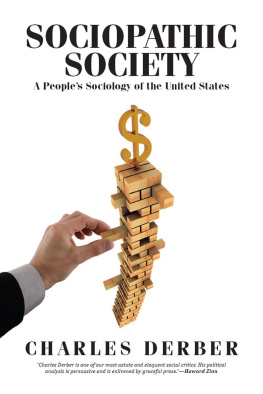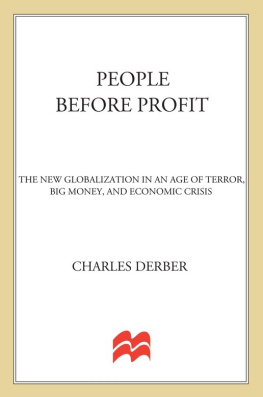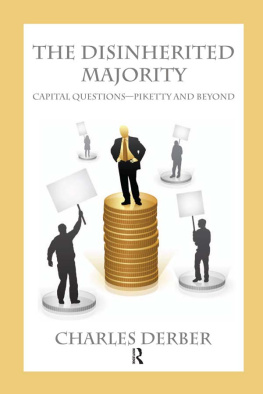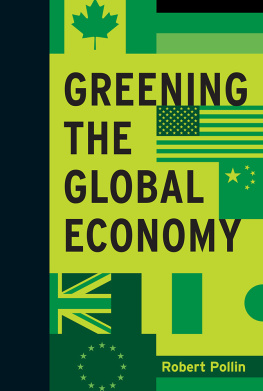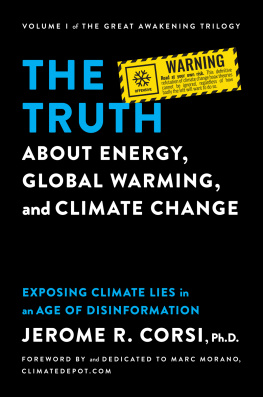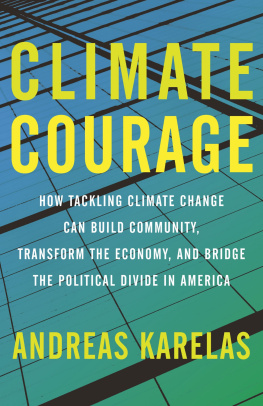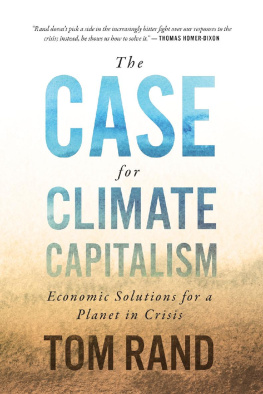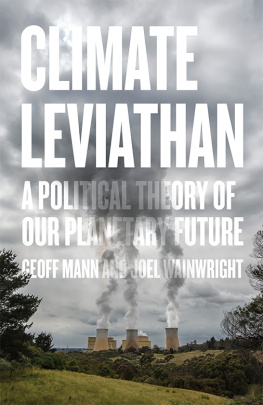To Elena
And to climate change activists everywhere
First published 2010 by Paradigm Publishers
Published 2016 by Routledge
2 Park Square, Milton Park, Abingdon, Oxon OX14 4RN
711 Third Avenue, New York, NY 10017, USA
Routledge is an imprint of the Taylor & Francis Group, an informa business
Copyright 2010, Taylor & Francis.
All rights reserved. No part of this book may be reprinted or reproduced or utilised in any form or by any electronic, mechanical, or other means, now known or hereafter invented, including photocopying and recording, or in any information storage or retrieval system, without permission in writing from the publishers.
Notice:
Product or corporate names may be trademarks or registered trademarks, and are used only for identification and explanation without intent to infringe.
Library of Congress Cataloging-in-Publication Data
Derber, Charles.
Greed to green : solving climate change and remaking the economy / Charles Derber.
p. cm.
Includes bibliographical references and index.
ISBN 978-1-61205-343-1
1. Environmental policyEconomic aspects. 2. Climatic changesEconomic
aspects. 3. CapitalismEnvironmental aspectsUnited States. I. Title.
HC79.E5D454 2010
363.7387460973dc22
2009026416
Designed and Typeset by Straight Creek Bookmakers.
ISBN 13: 978-1-59451-811-9 (hbk)
ISBN 13: 978-1-59451-812-6 (pbk)
Capitalisms Time Bomb and the Fierce Urgency of Now
The dictionary defines a time bomb as something that threatens to have an abruptly disastrous outcome in the future. Climate changethe largely imperceptible rise in our greenhouse gas emissions and earth temperatureis a time bomb, and this book suggests how we can defuse it.
Humanity has confronted other time bombssuch as the threat of allout nuclear war. They make up two of a broader special category: existential threats that could potentially end human civilization. During the cold war, the editors of the Bulletin of the Atomic Scientists regularly printed its famous Doomsday Clock, putting the minute hand at one minute to midnight during the Cuban missile crisis. The Bulletin now sets the clock to monitor the threats to human survival from both nuclear war and climate change, setting the clock at this writing at five minutes to midnight.
It makes intuitive sense that changing our perceptions of time is important in defusing a time bomb. The very idea of a time bombespecially one whose tick-tock, tick-tock we can hear but ignorehints at ignorance or indifference to the future and a time horizon shorter than the period in which the time bomb will explode. The climate time bomb is moving potentially out of our control because we are living in a socioeconomic system that relentlessly shrinks our time horizons and paralyzes our will to act on future common needs.
A solution to climate change has to help us change our current experience of time as part of a broader remaking of our economy and culture. Our perceptions of time are one part of our culture and mind-set, with deep roots in our capitalist order. Climate changeand the pathology of our short-term mind-setis so intertwined with our crisis-riddled economy that solutions to global warming cannot happen without rapid systemic changes in our capitalist order, a defining theme of this book.
The reality of climate change as a long-term systemic social crisis with a short-term action window shapes the solutions I offer here. All of us, ordinary citizens and world leaders, must recognize climate change as an urgent existential threat organically linked to our economic model and way of life. I propose here that the threat is so grave and urgent, and the U. S. responsibility so central, that the president invoke his powersprescribed carefully and judiciously in the Constitution for periods of extraordinary crisisto bring all of us together in partnership to create decisive emergency action now.
I focus this book on solutions. Such solutions must (1) meet the new time constraints of nature and (2) transform our political economy because climate change is, indeed, capitalisms time bomb, a reflection of inner contradictions in the workings of our markets, politics, and consumerist culture. I show how the president and the rest of us can act just fast enough to avoid catastrophe.
In the pages that follow, I offer a brief map to the rest of the book. In , I show that grassroots action must lead change both at home and abroad.
Truth and Denial
In an age of climate change, the consequences of fudging, distorting, spinning, or denying truth are more serious than in other eras. This is the era in which we can least afford to disrespect truth. The scientific consensus is that climate change is a threat to human civilization and that the window of opportunity to prevent catastrophe is rapidly closing.
The very idea of truth has been weakened in our new postmodern capitalist era. Princeton philosopher Harry Frankfort argues that we live in a culture of BS, where powerful corporations and political leaders use advanced electronic technologies to spin or fudge truth for their own interests.
Disrespect for the truth about climate change is creating a tragedy. In and politics that lead people to deny and ignore certain kinds of truth and move like wildfire to act on others. In our short-term culture, long-term truths that we cognitively accept as valid become abstract and disconnected from our urge to act. Our economic and political systems create short-term, ego-centered myopiaand we urgently need to help people act on long-term truths that lose electric charge in a short-term culture and are often subject to powerful forces of denial in capitalist and other societies.
In , I look closely at the battle between truth and the denial regime on the climate change issue. The denial regime is an interconnected network of corporations, politicians, and opinion-makers with vested economic interests and ideological perspectives shaping theirand ourclimate change views. It plays a major role in framing the public discourse and subordinating truth and in recent years has evolved into a stage 2 model of denial that rhetorically embraces the reality of climate change while undermining the public will to create the emergency action required. The denial regime is part of a larger ideological apparatus that is organized to protect our current form of capitalism while claiming to operate in the service of truth rather than power.
The president has a key role to play in resurrecting truth and combating the denial regime. His voice has special authority to invoke and act on both short- and long-term truths. The presidents truth-telling has never been more important than in the age of climate change, where the scientific truth about future civilizations and generations has been denied and overwhelmed by shorter-term crises. We are blessed with a new president who respects science and truth and a public long waiting to hear both.


